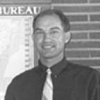More than 1,600 Farm Bureau members attended the 89th annual meeting of the Illinois Farm Bureau December 7 to 10 in Chicago. There were 363 voting delegates from 96 county Farm Bureaus debating policy of the farm organization.
Five delegates represented the Peoria County Farm Bureau. Each county Farm Bureau president is a voting delegate, along with an additional delegate for every 500 voting (farmer) members in a county. Peoria County has approximately 1,600 voting members.
Delegates at the meeting elected Philip Nelson of LaSalle County as the 14th president. He replaces Ron Warfield, who served the organization for 10 years as president.
Nelson, and his wife, Carmen, operate a fourth-generation grain and livestock farm near Seneca, producing corn, soybeans, wheat, and alfalfa. The livestock operation includes a farrow-to-finish hog operation and cattle feedlot.
Richard Guebert, Jr. defeated Gary Luth of Allerton and Gerald Thompson of Colfax in a three-way race for Illinois Farm Bureau vice president. Guebert served as president of the Randolph County Farm Bureau 1996 to 2003. Nelson and Guebert will each serve two-year terms.
Congressional House Speaker Dennis Hastert was the keynote speaker on the first day of the conference. U.S. Sen. Dick Durbin spoke to the group on the second day. A key issue both legislators spoke about was the heavily debated energy bill.
Sen. Durbin told delegates he'll vote for the energy bill in 2004 if a controversial MTBE liability waiver is dropped from the measure. Durbin defended his participation in a filibuster against the energy bill earlier, calling the MTBE waiver an "egregious provision" that protects producers of a dangerous product.
One of the meeting's longest policy debates led to a new IFB policy on the issue of country of origin labeling (COOL) for meat. Delegates voted 201 to 146 in support of "establishing criteria for a certification process for country of origin labeling" that would not be burdensome for livestock producers.
COOL is set to take effect next September, but the appropriations bill being considered could delay its implementation for another two years. In the past, the Illinois Farm Bureau supported only voluntary labeling.
Delegates argued the new position places the Farm Bureau firmly in the middle on the contentious issue, suggesting a workable certification process for COOL could be developed in conjunction with a proposed national program for animal identification.
On education, delegates adopted much of an IFB task force report that calls for meaningful state incentives for voluntary consolidation and procedural changes to ease school reorganization through referendum.
In addition, delegates dropped IFB opposition to a state sales tax on services in anticipation of another statewide debate on education funding reform. Delegates reaffirmed their support for maintaining state sales tax exemptions on feed, seed, fertilizer, and farm equipment. IBI

